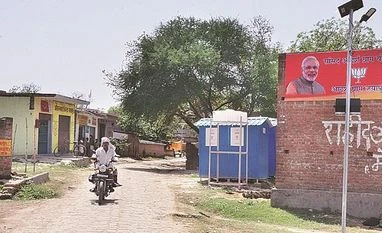A lower proportion of money spent on building India’s roads is going towards constructing rural ones.
The share is likely to slip below 5 per cent in the coming years, according to rating agency CRISIL's projections, which are based on Interim Budget documents, and have been shared with Business Standard. Provisional numbers suggest a 6.45 per cent share in financial year 2023-24 (FY24). It is likely to fall to 4.5 per cent by FY26.
Both National Highways and state roads have been allocated a significantly higher amount of money. National Highways spends are up 434 per cent since FY14 to Rs 1.7 trillion in the provisional figures for FY24. State roads have seen a 201 per cent increase in spends during the same period to Rs 1.9 trillion. Rural roads have seen a 70 per cent increase in the same period from Rs 14,400 crore to Rs 24,500 crore. Private spends have been included where figures are available. Overall, the increase in the total road expenditure has been lower for rural roads over the years. The share of total spends has also accordingly declined (chart 1).
The lower share for rural roads comes amid signs of a potential construction slowdown in the overall road segment, as the government seeks to bring in more diverse sources of capital for roadbuilding.
The Budget indicates that the government is seeking participation from the private sector, suggested Aniket Dani, director, CRISIL Research.
More From This Section
“They are also planning to award (projects) on a BOT (build-operate-transfer) basis, which will lead to less requirement of funds from them. However, a major push in this is yet to be seen.”
Awarding of projects is not as robust as before.
The Ministry of Road, Transport and Highways (MoRTH) awarded 3,111 km for National Highways in FY24 (April to December), and 6,216 km were executed. The awarding was the highest at 12,731 km in FY22 in recent years. This has since slowed due to cost escalation in the Bharatmala Phase – I. Funds are said to have been exhausted because of the rise in land and material costs. The government is also facing issues in land acquisition. Due to these two reasons, awarding is said to have declined this year (chart 2).
The decline in awarding will take two years to play out. After the awarding of road projects, getting the appointment date from which the developer can start construction takes around one year.
“So, the impact of awarding in FY24 will be seen in FY26 even if FY25 sees good construction,” Dani said.
)